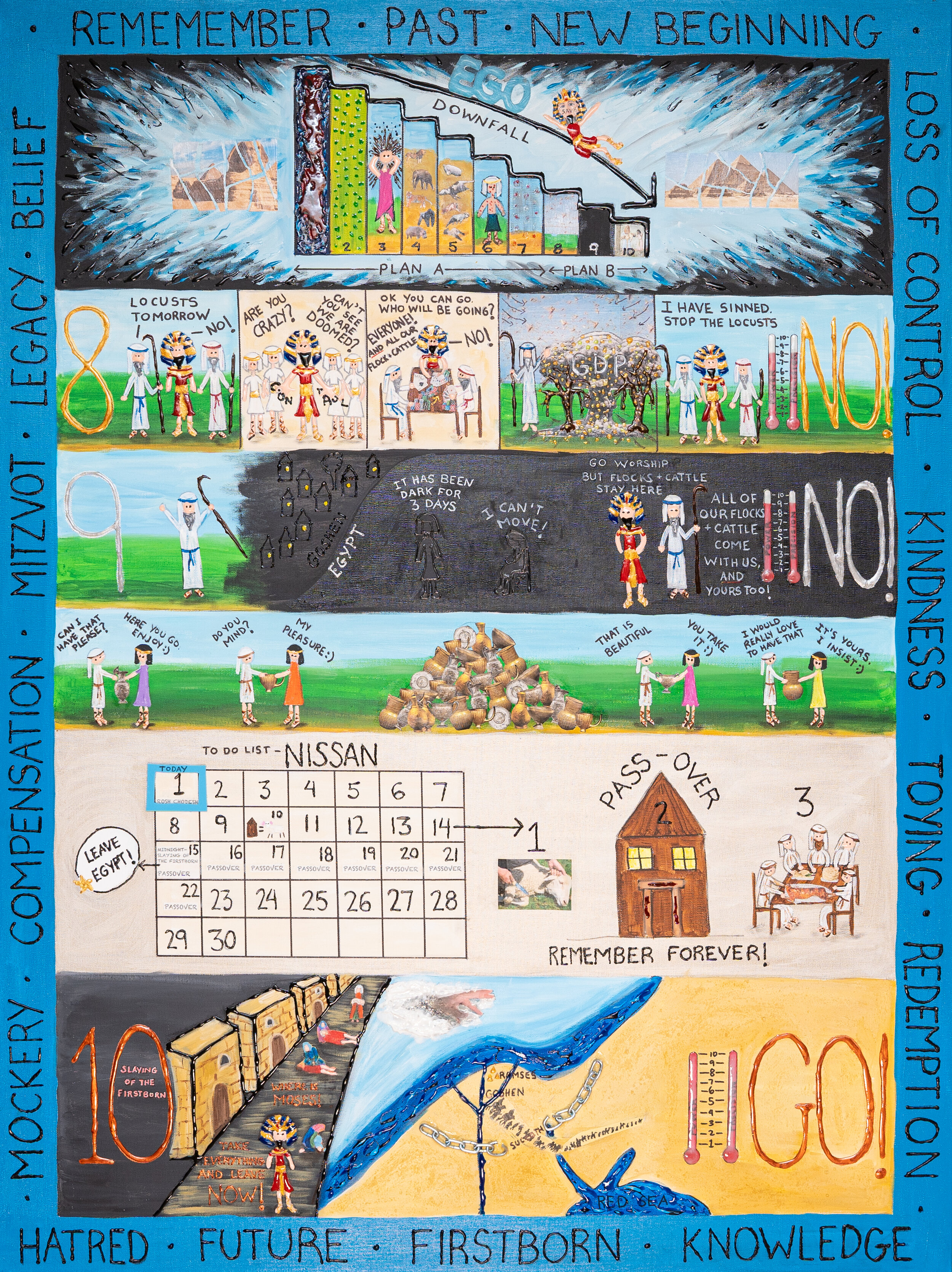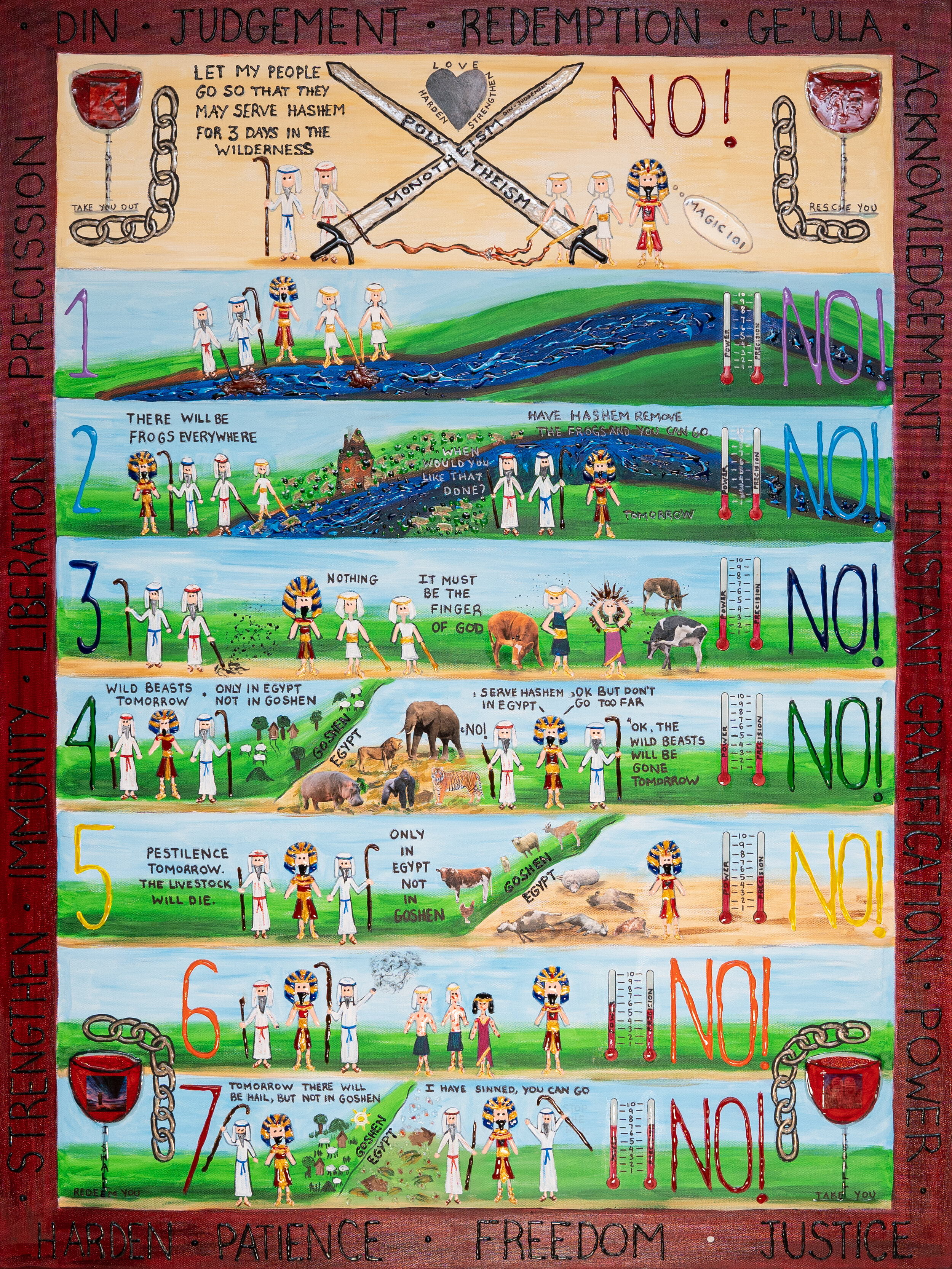Torah Study Date
Saturday, August 5, 2023
Verses Covered
Exodus (Sh’mot) 10:9-10:23
Next Session
Saturday, August 12, 2023
Starting at Exodus 10:24
Previously, we discussed why many think of the Exodus story rather than any or all the stories in Genesis as the founding event of the Jewish people. Having spent three years on Genesis (Bereishit), it seems odd to find the founding only after that! R. Myra suggested it is because the Exodus story leads to Sinai. She meant by that the giving of the law.
Last week, we discussed Moses telling Pharaoh that the Israelites would leave with all the people and all the sheep and cattle (Pharaoh had implied only some would go). R. Sara noted the merism of “with our young and with our old” (merism being the use of contrasting ideas to suggest a whole) and we noted the New JPS translation, “all—regardless of station,” which translates the meaning of the merism rather than retaining the merism. We noted Pharaoh’s ironic reply, where irony is saying the opposite of what you mean, stating he would let even the children go but then making the irony clear by saying that “evil is before your faces” and telling them only the men are to go to serve YHVH.
YHVH, then, we noted, tells Moses to reach out his hand for the locust and tells him it will eat everything that is left to eat. Moses, we noted, reaches out his staff—which Russell called God’s power stick–at the land of Egypt and YHVH drives an east wind–all day and night–that carries the locust swarm. The locusts settle in a thick mass, so thick that there had never been, and never will be, so many of them. We spent some time discussing “kadim” which can mean east or east wind. We discussed that the locusts hiding the eye of land (making the land unseen) foreshadows the next plague, the plague of darkness. We noted “eye of the land” and compared that to our idiom “face of the earth.”
We noted that, once again, when things get worse for him, he relents for a time, this time by saying that he has sinned against “YHVH, your god, and against you.” We noted that he says your god so that he is not accepting that YHVH is a god over him. Moses accedes to Pharaoh’s request that he go to YHVH and turn “this death” away from him. We thought it was interesting that he calls the situation “this death” and noted that he says away from me, continuing to focus his concern on himself. YHVH then uses a west wind to blow the locusts to the Red Sea so that not one locust was left in Egypt. We noted that not even one locust being left is extraordinary given how hard it is to get rid of insects.
Pharaoh then makes Pharaoh’s heart stiff or strong so that he does not let the people go. We noted the use of chazak (strength) rather than kavod (weight) in the passage. Ronen raised an idea we have considered before, that YHVH either strengthening or making Pharaoh’s heart could be understood as making Pharoah more of what he already is.
We then started a discussion of the plague of darkness. We noted YHVH telling Moses to reach his hand out to the skies and let a darkness be, a darkness that one can feel. We noted the idea of a tangible or palpable darkness. Moses does what he is told and there is a dismal darkness in Egypt for three days—though there is light in the homes of the children of Israel.
Our artwork this week is by Montreal Jewish artist, Sheila Nemtin from her series of fifty-four acrylic multimedia paintings, of the weekly Torah portions, entitled Tablet Tableaux, Bo (above), and Va’eira (below). The two paintings, among other things, provide a useful review of the plagues. In Bo, Nemtin portrays Pharaoh sliding to his downfall through the different plagues due to ego (just as we have mentioned that Pharaoh only seems concerned with himself). In Va’eira, she interprets the story as a battle between polytheism and monotheism (an interpretive frame we have not been using). She also does a good job of showing how Pharaoh over and over again seems to relent but then does not. Nemtin created the series for her son in order to convey to him the excitement and meaningfulness of the stories in the Torah.


